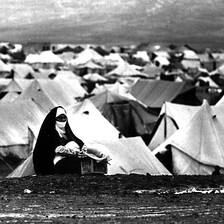The Electronic Intifada 3 December 2003
In early October, I meandered the shores of Lake Geneva, Switzerland with easy-laughing Mahmoud. We were bleary-eyed from international travel, and from many hours of animated discussions at our conference.
Scholars, lawyers and activists had converged to explore ways to implement the rights of Palestinians to return to and regain their homes, seized by Israel in 1948. This fate had befallen Villa Harun ar-Rashid, the Jerusalem home of my late grandfather, Hanna Ibrahim Bisharat. We had been inspired by accounts of successful campaigns for housing restitution for refugees and other dispossessed peoples in Bosnia, South Africa and Rwanda.
The sky was leaden, the wind off the slate lake bracing. But the fountain at the end of the lake lofted exuberant white plumes of water toward the heavens, and seemed to elevate with them our hopes and dreams for a more just and peaceful future.
Little did we suspect that in other conference rooms across the same city, Israelis and Palestinians had been conducting covert, informal negotiations for two years toward what are now touted as the “Geneva Accord.” The agreement, while envisioning a Palestinian state in the West Bank and Gaza Strip, studiously avoids mention of the very rights Mahmoud and I, and many others, are fighting to protect. The negotiators, prominent private citizens, include former Israeli Justice Minister Yossi Beilin and former Palestinian Information and Culture Minister Yasser Abed Rabbo.
Israeli Prime Minister Ariel Sharon has vehemently attacked the unofficial pact, and the negotiators have been condemned as irresponsible meddlers. The accord has no chance of adoption in the immediate future.
Its principal objective may have only been didactic: to teach Israelis there is an alternative to the militaristic policies of Sharon.
The pointed silence regarding the Palestinian right of return, however, means that an important opportunity has been missed to apprise Israelis, and the world, of a critical reality. No real or lasting peace will be achieved in the area until Israel finally admits the long-denied truth, accepts moral responsibility and apologizes for its forcible exile of Palestinian refugees 55 years ago.
In 1948, three quarters of a million Palestinians were driven from what became Israel, their homes, land and possessions taken over by the new Jewish state. Most were victims of direct military attacks, forcible expulsion orders or a deliberate campaign of terror and intimidation, fueled by actual massacres. A post-war internal report from the Haganah (a quasi-official Jewish militia) stated that of 391,000 Palestinians who had fled by June, 1948, some 73 percent had done so in response to Jewish military operations.
Palestinian villagers were often attacked at night, from two or three sides, while a road to the closest Arab country was left open. Their flight was hastened by news of massacres committed by Zionist forces, the most infamous of which occurred on April 9, 1948 in Deir Yassin. Up to 254 mostly unarmed Palestinians were slaughtered. Some were paraded in Jerusalem on trucks before being executed.
Describing the July 10, 1948 attack on Kweikat, near Haifa, a villager attested: “We were awakened by the loudest noise we had ever heard, shells exploding and artillery fire … the whole village was in panic … Most of the villagers began to flee with their pajamas on. The wife of Qasim Ahmad Said fled [mistakenly] carrying a pillow in her arms instead of her child.”
Exile involved more than material deprivation. Palestinians lost their homes, belongings, fields, orchards, workshops, possessions, professions — but more than that they lost their human dignity. Any people that has suffered massive wrongs — African-Americans, Japanese-Americans, Jews — understand the special wound of victimization for who you are, not what you have done.
Like slavery for African-Americans, internment for Japanese-Americans and the Nazi holocaust for Jews, the “Nakba” (“Catastrophe”) was a seminal event in the consciousness of the Palestinian people. No act of the Palestinians justified their expulsion. Their only “crime” was that they were born Christians and Muslims in a place coveted by the Zionist movement for an exclusive Jewish state, and refused to slink off into history as a vanquished people.
As Israel’s first prime minister, David Ben Gurion, once candidly admitted to a colleague: “If I were an Arab leader I would never make terms with Israel. That is natural: We have taken their country. Sure, God promised it to us, but what does that matter to them? Our God is not theirs. We come from Israel, it’s true, but 2,000 years ago, and what is that to them? There has been anti-Semitism, the Nazis, Hitler, Auschwitz, but was that their fault? They only see one thing: We have come here and stolen their country.” (The comment was made to Nahum Goldmann, as reported in the latter’s book, “The Jewish Paradox.”)
The U.N. quickly affirmed the right of the Palestinians to choose to return to their homes, or to receive compensation and support for resettlement. Israel stone-walled the entire international community, rejecting virtually any return by the refugees of 1948, a position the U.S. delegate to the U.N. Conciliation Committee on Palestine denounced as “morally reprehensible.”
An official Israeli Transfer Committee under Yosef Weitz mobilized to block the return of Palestinian refugees, orchestrating the obliteration of entire Palestinian villages, or their resettlement with Jewish immigrants.
The Transfer Committee also devised a propaganda plan to justify Israel’s rejection of the right of return. Israel soon claimed that Palestinians left their homes after radio broadcasts by Arab leaders bidding them to evacuate. Later review of broadcast transcripts proved this claim to be a fabrication. Israel argued that Jewish emigration from Arab countries, some of which flowed to Israel, constituted a “population exchange” that compensated for its expulsion of the Palestinians — as if two wrongs made a right.
Israel also blamed Arab states for “failing to resettle Palestinian refugees” — something the Palestinians themselves actively resisted. Five and a half decades later, Palestinian refugees and their offspring number 5.5 million people.
Israel’s denial of responsibility for the refugees, and rejection of their repatriation — unchallenged by the new “Geneva Accord” — is, at this stage, as galling and hurtful as the original expulsion itself. The pain of denial should be intuitively understood by victims of the Nazi holocaust — indeed, by all of us who are repelled by denial of that terrible episode in history.
Thus the chances for long-term peace and reconciliation would be greatly advanced if the Israeli government were to stop hiding the truth. As remote as peace seems today, halting the 55-year cover-up and apologizing would place peace negotiations between the two peoples on an entirely different ground. At this stage, the dream of return to Palestine is for many Palestinians a shield against despair, and recognition of the right to return a matter of great principle. A sincere Israeli apology would be a milestone toward reconciliation that no Palestinian could ignore.
Formidable obstacles lie in the path to apology. Many Israelis doubt that Israel deliberately expelled the Palestinians. But many others — elders who remember the events of 1948, or others who have read histories of the period based on recently declassified documents — know the truth.
More difficult are Israeli fears about the consequences of such an admission, especially the possible return of large numbers of Palestinians to Israel, and the attendant threat to the Jewish character of their state. Yet establishing an ethnically exclusive state in someone else’s country may not be a “right” that merits protection. Accepting back refugees, who would form a larger Palestinian minority in Israel than has been deemed ideal for Jews, may be the price Israel must pay for establishing a Jewish state in Arab Palestine.
Nor would an apology inevitably cause the return of millions of Palestinian refugees. It is entirely possible that, with the dignity of Palestinian refugees ameliorated by an apology, Palestinians’ decisions regarding actual return would be based on more purely pragmatic grounds.
Of course, part of Israel’s political elite may still seek exclusive Jewish control over all of former Palestine, including the West Bank and Gaza Strip. If so — and there is much in current Israeli policy that supports such an inference — apology is the furthest thing from their minds, and the regional forecast is for blood. One must place hope in the small but growing number of Israelis who see through the curtain of fear behind which their leaders hide their expansionist policies, and in the desires of manyother Israelis to live a simple life of peace.
I can add personal testimony to the power of apology. Last May, I wrote about going to visit my grandparents’ home in Jerusalem, and my exchanges with its Jewish residents, and their attempts to deny my family’s connection to our home. After my story was published, I heard from three other Israelis who had lived there after its expropriation in 1948. Two of the three discussed the home only casually, without acknowledging my family’s dispossession.
But the third person was different. His message to me began: “I read your article with special interest, and with an odd, but distorted sense of connection to you.” He explained that he was a native-born Israeli, and while a member of the Haganah during the 1948 war, was stationed in Villa Harun ar-Rashid for a period of three months. He ended by saying that he would like to meet me, and apologize for the taking of my family’s home.
Fortunately, the gentleman lived nearby and, indeed, we met. After an hour of friendly conversation, this dear man reached across the table, extending his hand, and said: “I am sorry. I was blind. What we did was wrong, but I participated in it and I cannot deny it.” He added: ” I owe your family three months rent,” and we both broke into laughter.
It is hard to fully describe what I experienced. But vindication was secondary to the tremendous surge of admiration I felt for this man’s moral courage. I was inspired, truly, to match his humanity. Just that response, writ large, is what awaits Israel if it could bring itself to apologize to the Palestinians. There is an untapped reservoir of Palestinian magnanimity and good will that could transform the relations between the two peoples, and make things possible that are not possible today.
Related Links
George Bisharat is a law professor at the University of California’s Hastings College of Law in San Francisco. This article first appeared in The Sacromento Bee on 30 November 2003. Reprinted with permission.




